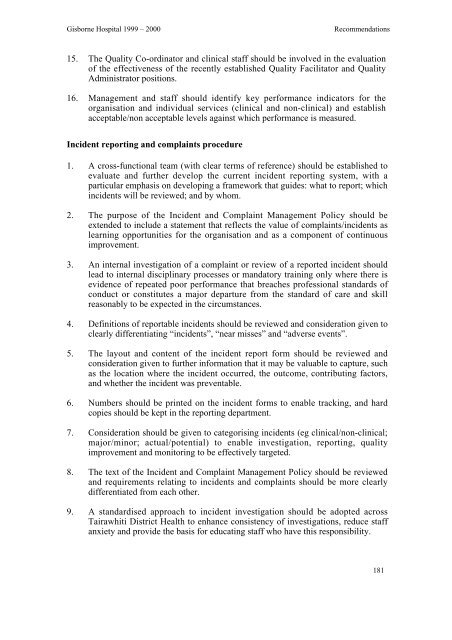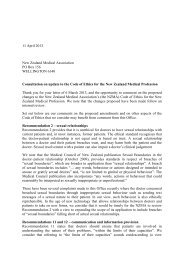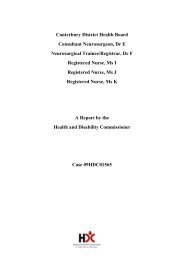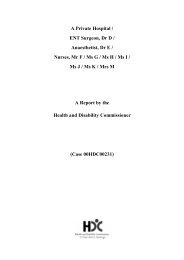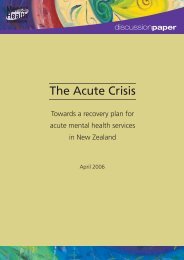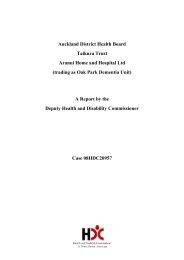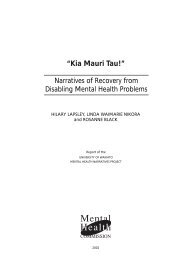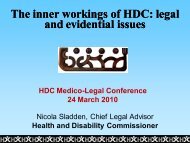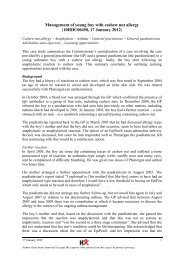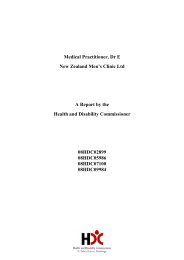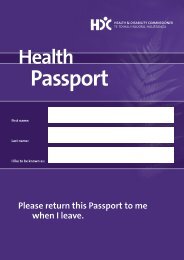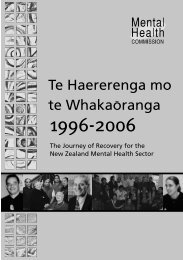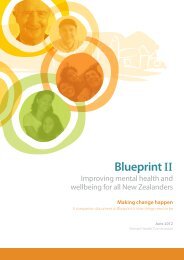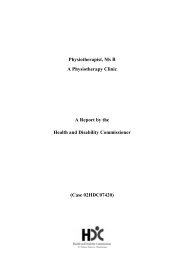Gisborne Hospital Report - Health and Disability Commissioner
Gisborne Hospital Report - Health and Disability Commissioner
Gisborne Hospital Report - Health and Disability Commissioner
You also want an ePaper? Increase the reach of your titles
YUMPU automatically turns print PDFs into web optimized ePapers that Google loves.
<strong>Gisborne</strong> <strong>Hospital</strong> 1999 – 2000<br />
Recommendations<br />
15. The Quality Co-ordinator <strong>and</strong> clinical staff should be involved in the evaluation<br />
of the effectiveness of the recently established Quality Facilitator <strong>and</strong> Quality<br />
Administrator positions.<br />
16. Management <strong>and</strong> staff should identify key performance indicators for the<br />
organisation <strong>and</strong> individual services (clinical <strong>and</strong> non-clinical) <strong>and</strong> establish<br />
acceptable/non acceptable levels against which performance is measured.<br />
Incident reporting <strong>and</strong> complaints procedure<br />
1. A cross-functional team (with clear terms of reference) should be established to<br />
evaluate <strong>and</strong> further develop the current incident reporting system, with a<br />
particular emphasis on developing a framework that guides: what to report; which<br />
incidents will be reviewed; <strong>and</strong> by whom.<br />
2. The purpose of the Incident <strong>and</strong> Complaint Management Policy should be<br />
extended to include a statement that reflects the value of complaints/incidents as<br />
learning opportunities for the organisation <strong>and</strong> as a component of continuous<br />
improvement.<br />
3. An internal investigation of a complaint or review of a reported incident should<br />
lead to internal disciplinary processes or m<strong>and</strong>atory training only where there is<br />
evidence of repeated poor performance that breaches professional st<strong>and</strong>ards of<br />
conduct or constitutes a major departure from the st<strong>and</strong>ard of care <strong>and</strong> skill<br />
reasonably to be expected in the circumstances.<br />
4. Definitions of reportable incidents should be reviewed <strong>and</strong> consideration given to<br />
clearly differentiating “incidents”, “near misses” <strong>and</strong> “adverse events”.<br />
5. The layout <strong>and</strong> content of the incident report form should be reviewed <strong>and</strong><br />
consideration given to further information that it may be valuable to capture, such<br />
as the location where the incident occurred, the outcome, contributing factors,<br />
<strong>and</strong> whether the incident was preventable.<br />
6. Numbers should be printed on the incident forms to enable tracking, <strong>and</strong> hard<br />
copies should be kept in the reporting department.<br />
7. Consideration should be given to categorising incidents (eg clinical/non-clinical;<br />
major/minor; actual/potential) to enable investigation, reporting, quality<br />
improvement <strong>and</strong> monitoring to be effectively targeted.<br />
8. The text of the Incident <strong>and</strong> Complaint Management Policy should be reviewed<br />
<strong>and</strong> requirements relating to incidents <strong>and</strong> complaints should be more clearly<br />
differentiated from each other.<br />
9. A st<strong>and</strong>ardised approach to incident investigation should be adopted across<br />
Tairawhiti District <strong>Health</strong> to enhance consistency of investigations, reduce staff<br />
anxiety <strong>and</strong> provide the basis for educating staff who have this responsibility.<br />
181


